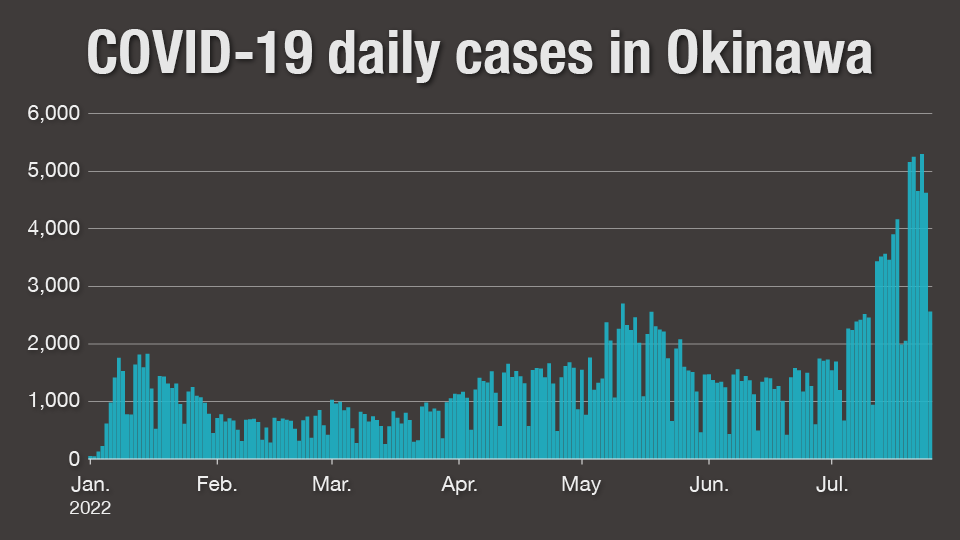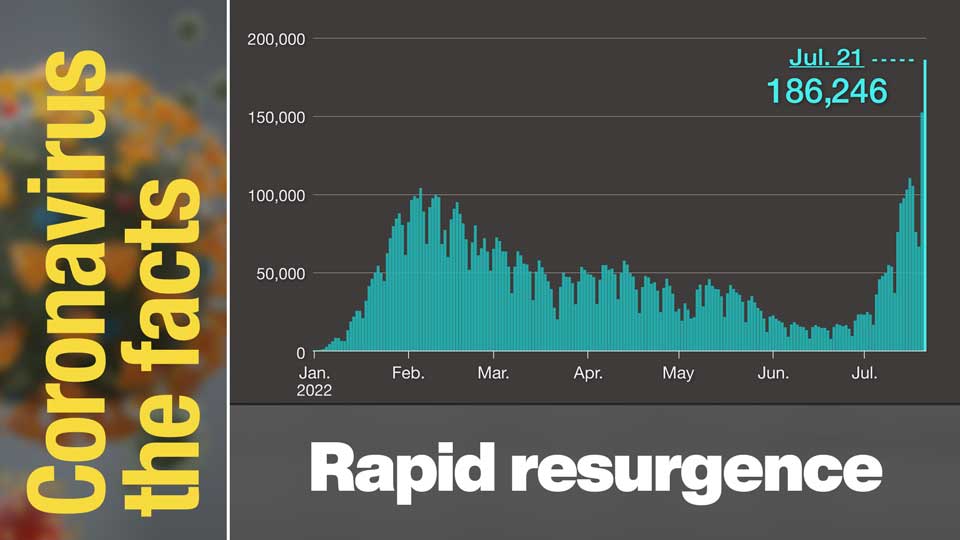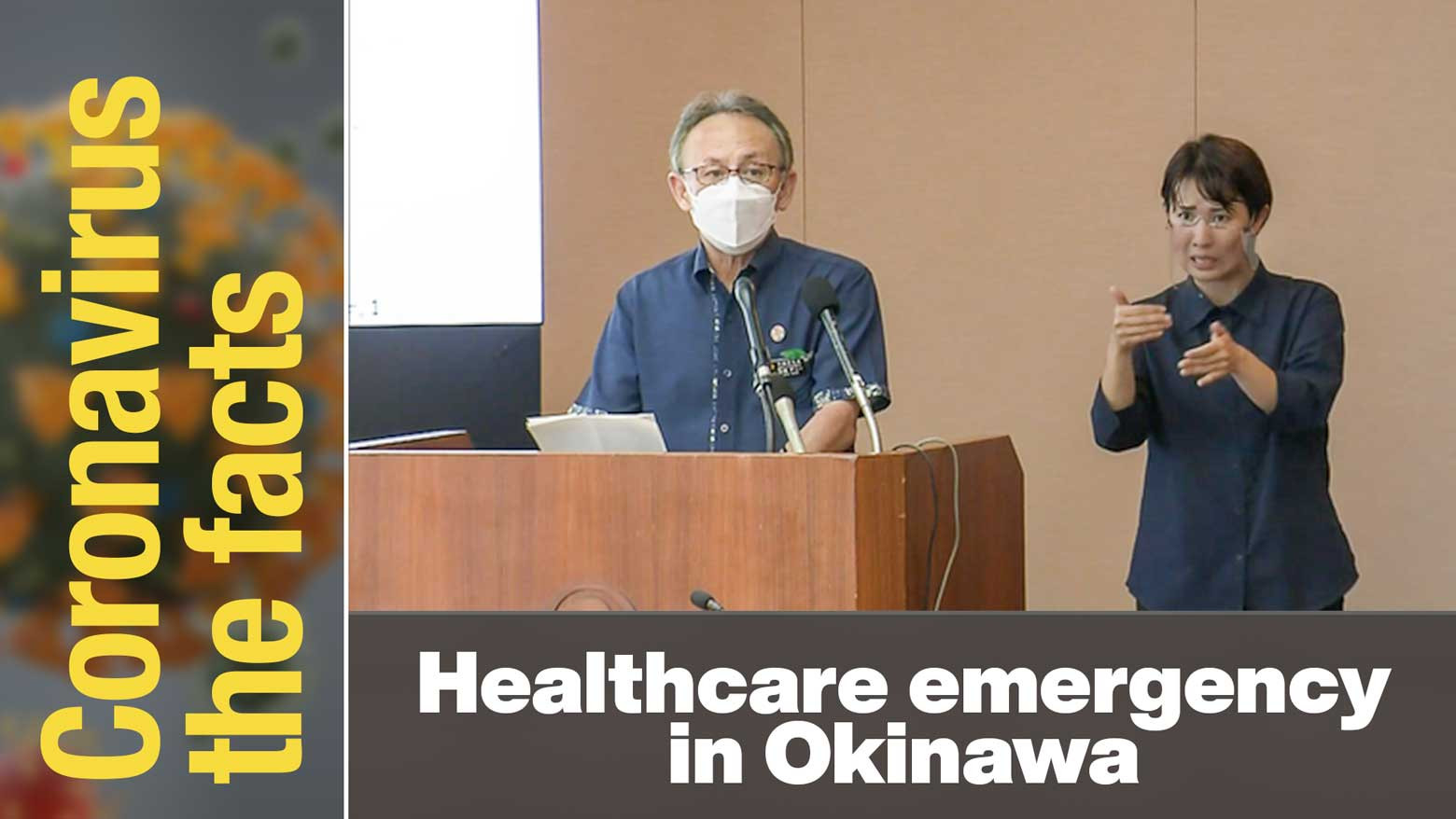This article is part of a series on important coronavirus-related information. Click here to read other installments: #Coronavirus the facts. Find the latest information on everything COVID-19.
Record case numbers
Japan reported a record 200,944 new coronavirus cases on July 23 and its medical system is under increasing strain. The southern island prefecture of Okinawa is especially hard-hit.
Okinawa is seeing about 5,000 new cases per day, a record. The number of infections per 100,000 of the population for the week ending July 23 was 1,923.82. It is the highest rate in the country, 2.5-times more than the average in other areas.
As of July 25, Okinawa's hospital bed occupancy rate for COVID patients was 82.3 percent, also the highest in the country. The occupancy rate for beds reserved for serious cases stood at 35.5 percent.

Hospital services reduced amid staff shortage
Authorities in Okinawa Prefecture declared a healthcare emergency on July 21. To ease the burden on hospitals, people are being asked to avoid using emergency outpatient services for minor issues and undergo coronavirus tests elsewhere.
The prefecture's 27 facilities that deal with coronavirus patients have been asked to scale back regular medical services and find more beds for infected people. Elective surgery, examinations and tests may be postponed for non-emergencies. Most of the medical facilities are facing staff shortages, with infections and close-contact status removing more than 1,200 from the workforce.
Doctor: "We can't save lives"
At Yuuai Medical Center in Tomigusuku City, staff are overwhelmed. A doctor at the hospital, Yamauchi Sunao, describes the crisis: "Here in Okinawa, we're unable to provide adequate medical care to those in need. We are in a desperate situation that we can't save lives that we could normally save."
He says the influx of summer holidaymakers into the area is making things worse. Tourists are calling emergency services for non-COVID reasons, such as alcohol poisoning and heatstroke. Yamauchi urges people to consider their impact on Okinawa if they choose to visit.
Nurses to be dispatched
Japan's central government will send a team to coordinate the dispatch of extra nurses and support staff in Okinawa Prefecture. Up to 30 nurses are expected to be sent, starting in August.
People's movement restricted
Okinawa's prefectural government enacted restrictions of its own for residents and visitors on July 22. They are expected to continue through August 14 and include:
For residents
- Avoid non-essential outings.
- The elderly and other people at high risk of developing severe symptoms should limit social contact other than the family members with whom they live.
- Group restaurant dining is limited to four people, staying for at most two hours.
- Avoid using emergency outpatient services for minor issues and coronavirus tests
For visitors
- Monitor health closely, and postpone travel if they feel unwell.
- Complete vaccinations two weeks before the start of a trip, and use testing to ensure safe participation in events and social interactions.
- For people with underlying health problems, bring extra medicines as Okinawa's medical system is under strain.
For dining establishments
- A maximum of four people is allowed per table, with a time limit of two hours.
- Adhere to anti-infection measures including proper ventilation, checking staff and customers' temperatures, and disinfection.
For event organizers
- Organizers of events involving more than 1,000 people are asked to present anti-infection plans to the prefectural government. Events at which alcohol is to be served are asked to postpone.
Central government has no plans for restrictions
On July 24, Yamagiwa Daishiro, minister in charge of coronavirus measures, said that the central government does not plan to introduce any new restrictions on people's movements. He explained the aim is to allow economic and social activities to recover by making the best use of vaccines and testing, and maintain vigilance in infection situations.

*Related article: No new COVID restrictions in Japan despite record cases (July 22, 2022)
This information is accurate as of July 26, 2022.
